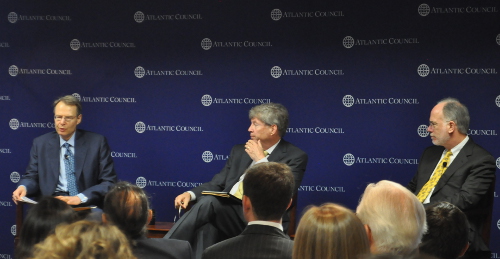On June 19, the Atlantic Council Eurasia Center hosted a discussion on the IMF’s recent presentation “Two Decades of Transition in Caucasus and Central Asia: Taking Stock and the Road Ahead.” Dr. Juha Kähkönen, a deputy director of the IMF’s Middle East and Central Asia department spoke about the major achievements and the remaining challenges in the monetary and fiscal policies of the emerging markets in the region. Ambassador William Courtney, former US ambassador to Georgia and Kazakhstan focused on the interaction between politics and the economy. The discussion was moderated by Ambassador Ross Wilson, director of the Dinu Patriciu Eurasia Center.
The Caucasus and Central Asia (CCA) countries have the potential to become vibrant emerging market economies over the next decade, but many challenges need to be addressed along the way. These problems include sometimes ineffective governance, political systems that lack public participation and transparency, poverty, and a shortage of cooperation among countries that live side by side. The discussants touched upon the opportunities to improve connections to and within the region as well as other political and economic obstacles and the ways to overcome them. Dr. Kähkönen posed the following provocative questions:
- Do capacity building projects effectively strengthen institutions, and prepare CCA countries for a time when political economy constraints may lessen?
- Are there ways to foster regional cooperation—such as through the Central Asia Regional Economic Cooperation (CAREC)—that will break through the regional deadlock on resolving water, energy and transport issues?
- How much uncertainty, and what opportunities, arise for CCA countries from likely medium-term developments in Afghanistan and from the (re)emerging roles of China and Russia?
Image: web_11.jpg
